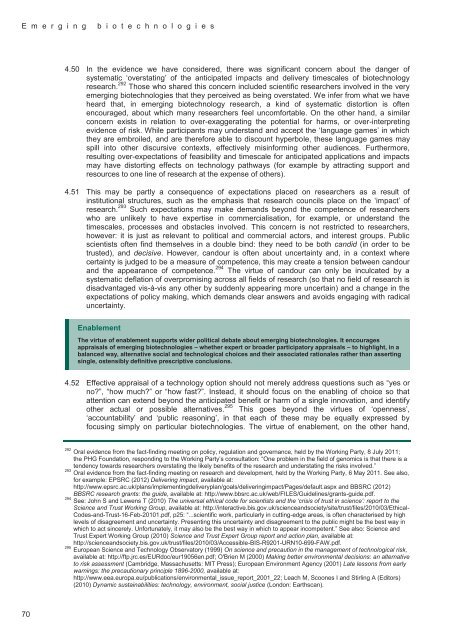Emerging biotechnologies: full report - Nuffield Council on Bioethics
Emerging biotechnologies: full report - Nuffield Council on Bioethics
Emerging biotechnologies: full report - Nuffield Council on Bioethics
You also want an ePaper? Increase the reach of your titles
YUMPU automatically turns print PDFs into web optimized ePapers that Google loves.
E m e r g i n g b i o t e c h n o l o g i e s<br />
4.50 In the evidence we have c<strong>on</strong>sidered, there was significant c<strong>on</strong>cern about the danger of<br />
systematic ‘overstating’ of the anticipated impacts and delivery timescales of biotechnology<br />
research. 292 Those who shared this c<strong>on</strong>cern included scientific researchers involved in the very<br />
emerging <str<strong>on</strong>g>biotechnologies</str<strong>on</strong>g> that they perceived as being overstated. We infer from what we have<br />
heard that, in emerging biotechnology research, a kind of systematic distorti<strong>on</strong> is often<br />
encouraged, about which many researchers feel uncomfortable. On the other hand, a similar<br />
c<strong>on</strong>cern exists in relati<strong>on</strong> to over-exaggerating the potential for harms, or over-interpreting<br />
evidence of risk. While participants may understand and accept the ‘language games’ in which<br />
they are embroiled, and are therefore able to discount hyperbole, these language games may<br />
spill into other discursive c<strong>on</strong>texts, effectively misinforming other audiences. Furthermore,<br />
resulting over-expectati<strong>on</strong>s of feasibility and timescale for anticipated applicati<strong>on</strong>s and impacts<br />
may have distorting effects <strong>on</strong> technology pathways (for example by attracting support and<br />
resources to <strong>on</strong>e line of research at the expense of others).<br />
4.51 This may be partly a c<strong>on</strong>sequence of expectati<strong>on</strong>s placed <strong>on</strong> researchers as a result of<br />
instituti<strong>on</strong>al structures, such as the emphasis that research councils place <strong>on</strong> the ‘impact’ of<br />
research. 293 Such expectati<strong>on</strong>s may make demands bey<strong>on</strong>d the competence of researchers<br />
who are unlikely to have expertise in commercialisati<strong>on</strong>, for example, or understand the<br />
timescales, processes and obstacles involved. This c<strong>on</strong>cern is not restricted to researchers,<br />
however: it is just as relevant to political and commercial actors, and interest groups. Public<br />
scientists often find themselves in a double bind: they need to be both candid (in order to be<br />
trusted), and decisive. However, candour is often about uncertainty and, in a c<strong>on</strong>text where<br />
certainty is judged to be a measure of competence, this may create a tensi<strong>on</strong> between candour<br />
and the appearance of competence. 294 The virtue of candour can <strong>on</strong>ly be inculcated by a<br />
systematic deflati<strong>on</strong> of overpromising across all fields of research (so that no field of research is<br />
disadvantaged vis-à-vis any other by suddenly appearing more uncertain) and a change in the<br />
expectati<strong>on</strong>s of policy making, which demands clear answers and avoids engaging with radical<br />
uncertainty.<br />
Enablement<br />
The virtue of enablement supports wider political debate about emerging <str<strong>on</strong>g>biotechnologies</str<strong>on</strong>g>. It encourages<br />
appraisals of emerging <str<strong>on</strong>g>biotechnologies</str<strong>on</strong>g> – whether expert or broader participatory appraisals – to highlight, in a<br />
balanced way, alternative social and technological choices and their associated rati<strong>on</strong>ales rather than asserting<br />
single, ostensibly definitive prescriptive c<strong>on</strong>clusi<strong>on</strong>s.<br />
4.52 Effective appraisal of a technology opti<strong>on</strong> should not merely address questi<strong>on</strong>s such as “yes or<br />
no?”, “how much?” or “how fast?”. Instead, it should focus <strong>on</strong> the enabling of choice so that<br />
attenti<strong>on</strong> can extend bey<strong>on</strong>d the anticipated benefit or harm of a single innovati<strong>on</strong>, and identify<br />
other actual or possible alternatives. 295 This goes bey<strong>on</strong>d the virtues of ‘openness’,<br />
‘accountability’ and ‘public reas<strong>on</strong>ing’, in that each of these may be equally expressed by<br />
focusing simply <strong>on</strong> particular <str<strong>on</strong>g>biotechnologies</str<strong>on</strong>g>. The virtue of enablement, <strong>on</strong> the other hand,<br />
292 Oral evidence from the fact-finding meeting <strong>on</strong> policy, regulati<strong>on</strong> and governance, held by the Working Party, 8 July 2011;<br />
the PHG Foundati<strong>on</strong>, resp<strong>on</strong>ding to the Working Party’s c<strong>on</strong>sultati<strong>on</strong>: “One problem in the field of genomics is that there is a<br />
tendency towards researchers overstating the likely benefits of the research and understating the risks involved.”<br />
293 Oral evidence from the fact-finding meeting <strong>on</strong> research and development, held by the Working Party, 6 May 2011. See also,<br />
for example: EPSRC (2012) Delivering impact, available at:<br />
http://www.epsrc.ac.uk/plans/implementingdeliveryplan/goals/deliveringimpact/Pages/default.aspx and BBSRC (2012)<br />
BBSRC research grants: the guide, available at: http://www.bbsrc.ac.uk/web/FILES/Guidelines/grants-guide.pdf.<br />
294 See: John S and Lewens T (2010) The universal ethical code for scientists and the ‘crisis of trust in science’: <str<strong>on</strong>g>report</str<strong>on</strong>g> to the<br />
Science and Trust Working Group, available at: http://interactive.bis.gov.uk/scienceandsociety/site/trust/files/2010/03/Ethical-<br />
Codes-and-Trust-16-Feb-20101.pdf, p25: “...scientific work, particularly in cutting-edge areas, is often characterised by high<br />
levels of disagreement and uncertainty. Presenting this uncertainty and disagreement to the public might be the best way in<br />
which to act sincerely. Unfortunately, it may also be the best way in which to appear incompetent.” See also: Science and<br />
Trust Expert Working Group (2010) Science and Trust Expert Group <str<strong>on</strong>g>report</str<strong>on</strong>g> and acti<strong>on</strong> plan, available at:<br />
http://scienceandsociety.bis.gov.uk/trust/files/2010/03/Accessible-BIS-R9201-URN10-699-FAW.pdf.<br />
295 European Science and Technology Observatory (1999) On science and precauti<strong>on</strong> in the management of technological risk,<br />
available at: http://ftp.jrc.es/EURdoc/eur19056en.pdf; O'Brien M (2000) Making better envir<strong>on</strong>mental decisi<strong>on</strong>s: an alternative<br />
to risk assessment (Cambridge, Massachusetts: MIT Press); European Envir<strong>on</strong>ment Agency (2001) Late less<strong>on</strong>s from early<br />
warnings: the precauti<strong>on</strong>ary principle 1896-2000, available at:<br />
http://www.eea.europa.eu/publicati<strong>on</strong>s/envir<strong>on</strong>mental_issue_<str<strong>on</strong>g>report</str<strong>on</strong>g>_2001_22; Leach M, Sco<strong>on</strong>es I and Stirling A (Editors)<br />
(2010) Dynamic sustainabilities: technology, envir<strong>on</strong>ment, social justice (L<strong>on</strong>d<strong>on</strong>: Earthscan).<br />
70
















